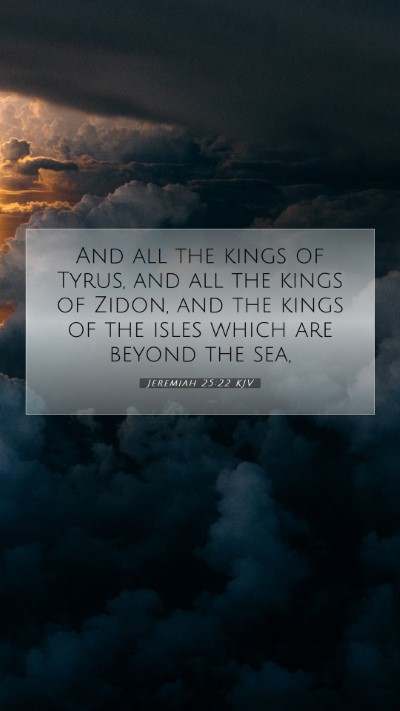Understanding Jeremiah 25:22
Jeremiah 25:22 states:
"And all the kings of Tyre, and all the kings of Sidon, and the kings of the isles which are beyond the sea,"
This verse, nestled within the prophetic words of Jeremiah, addresses the nations surrounding Israel and Judah, underscoring their eventual judgment. An understanding of this passage requires exploring its historical context and its implications in biblical prophecy.
Bible Verse Meanings
To comprehend this verse, we can draw on insights from various public domain commentaries, particularly those of Matthew Henry, Albert Barnes, and Adam Clarke.
Matthew Henry's Commentary
Henry notes that this passage emphasizes God's sovereignty over all nations, not just Israel. It suggests that just as God deals with His chosen people, He also holds accountable the surrounding nations—highlighting His universal dominion. The reference to the kings of Tyre and Sidon suggests a reckoning for their actions against God's people.
Albert Barnes' Notes
Barnes provides an analysis of the specific nations mentioned, indicating that Tyre and Sidon were significant trading cities with a history of conflict with Israel. He points out that their inclusion serves as a reminder of the reach of God's judgment. The phrase "the kings of the isles" reflects that God's authority extends beyond the geographical boundaries of Israel, encompassing all who stray from His path.
Adam Clarke's Commentary
Clarke expands on the importance of understanding these nations within their historical context. He remarks on the wealth and arrogance of Tyre and Sidon, noting that their eventual downfall is a testament to the principle that pride and opposition to God lead to destruction. Clarke emphasizes that this verse is not just a historical recount; it embodies a moral lesson on the consequences of sin.
Biblical Exegesis
In the study of Jeremiah 25:22, we must engage in a biblical exegesis that considers language, context, and theological implications. The mention of specific cities invites readers to explore themes of judgment, accountability, and the universal nature of God's authority.
Context of the Passage
This verse is part of a broader prophetic statement where Jeremiah warns of impending judgment on various nations as part of God’s plan. Understanding the socio-political landscape during Jeremiah's time is crucial to grasping the weight of the message.
Application and Reflection
How do we apply the meaning of this Bible verse to our daily lives? Reflecting on God’s justice toward nations can inspire us to be mindful of our actions as individuals and communities.
Practical Lessons
- Accountability: Just as nations were held accountable, we too must consider how our choices align with God's will.
- God’s Sovereignty: Recognizing that God reigns over all matters can provide comfort in uncertain times.
- Encouragement to Repent: The principle of judgment serves as an encouragement to seek repentance and restoration.
Related Bible Cross References
- Isaiah 23:1: A prophecy against Tyre, detailing judgment.
- Ezekiel 26: Describes the fall of Tyre.
- Amos 1:9-10: A condemnation of Tyre for excessive cruelty.
Conclusion
In summary, Jeremiah 25:22 serves as a poignant reminder that God’s judgment is just and far-reaching. Emphasizing the accountability of nations, this verse provides a foundation for deeper bible study insights and encourages believers to engage in thoughtful reflection on their spiritual journey.
Further Study
For those involved in bible study groups, this verse opens up discussions on the themes of justice, repentance, and God's sovereignty. It encourages a collective exploration of how Scripture speaks to both historical and modern contexts.


